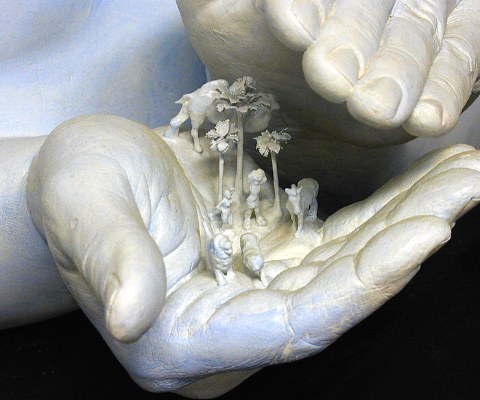A Taxonomy of Gods
How many ways can you be god? You know, when you make an artificial world, what are the different positions that you can assume as its creator? For this exercise I am imagining powers of creation that we humans do not currently possess, but seem on our way to acquiring — such as being able to instill choice in our creations.

A first taxonomy of species of gods:
— You design and craft each entity, one by one. You create them, and then invent their challenges, and architect their adventures. You author most of what happens, second by second. Novels and movies are made this way. There is no, or very little, free will of the creatures.
— You craft each creature but you give them a small measure choice while you design the larger plot points. Many cinematic video games are made this way. Creatures have some latitude, but the history of the game is constrained along certain channels to converge on plot points.
— You design and craft each entity, including those that comprise the environment, but you give me some significant measure of autonomy to some of them. What happens is less predictable.
— You design and craft each entity, with a measure of autonomy, but you constrain their history. Two options. You can set up constraints which prevent them from making certain choices at certain points (by removing the effect of their “choices” at that point — no matter what they choose, the same thing happens, although they may not be aware of this). Or,
— You design and craft each entity, with a measure of autonomy, but you constrain their history by intervening at certain points, with custom coded events to nudge the action in one direction or another.
— You design and craft each entity, and architect the environment, but you give the creations a measure of self-modification (and choice), so that they can redefine their roles. As above, you can either intervene with these modifications, or remain hands off.
— You design and craft a process which generates entities. Some video games use this method. The specific form and behavior of creatures are dictated by random code. This can either be deterministic — re-run it and the same creatures appear, or non-deterministic. This is much harder to do; but re-run it and different creatures appear.
— You design and craft an environment which generates a process. You don’t code or craft creatures per se. You code for a process which generates rules to make creatures. The actual process of how creatures are designed is emergent.
— You design and code a process which generates a process. You don’t even make the environment, you only make a process which may (or may not) make a process to create creatures. We might call this evolution. There are two types: In one, the process is biased to produce certain forms again and again. Re-run the game, and similar forms will evolve. Or,
— You design or code a process which evolves a process which yields different histories each time it is run.
— You design a meta-evolutionary process, but you can intervene at points to hand code a bias toward certain events, or nudge the course in certain directions.
— You design a universe, a platform, upon which creation self-organizes. Your platform is so constructed that the evolutionary design process itself will self-assemble. You have to design the universe.
— You don’t design the universe, or its laws. The laws themselves self-organize from merely being.
— You create a god, an instrument, that will create creatures in any of the methods described above. Sometimes called a demi-god.
— You create yourself.
Have I missed any?


